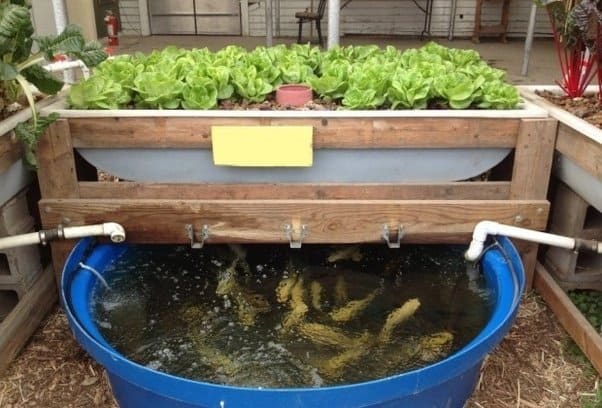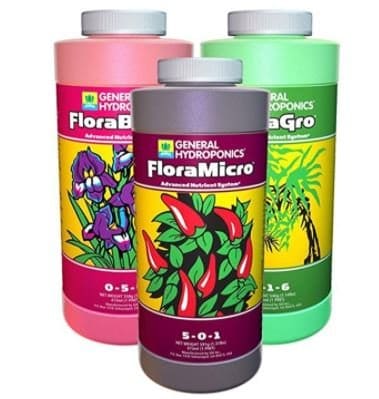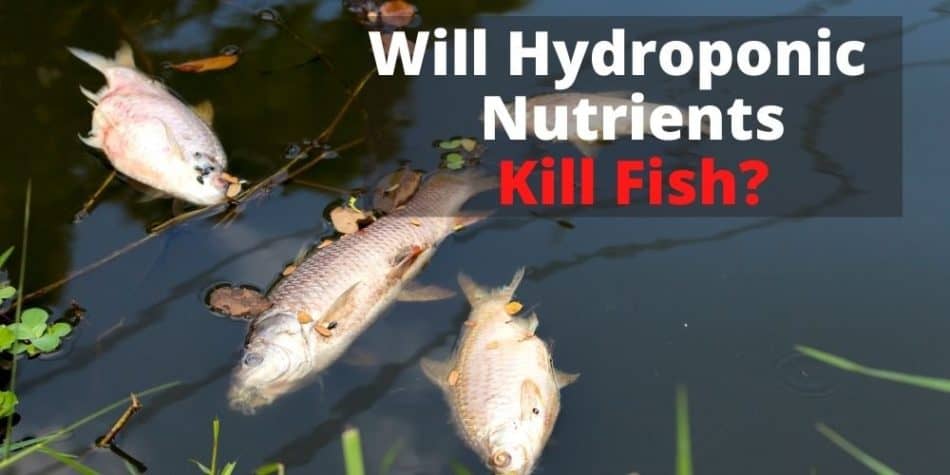Hydroponics combined with aquaculture is becoming one of the most widely adopted environmentally friendly ways of growing plants and fish at the same time.
If you’re getting into the field of aquaponics, there must be a question in your mind. That is, “Will Hydroponic Nutrients Kill Fish?” After all, some of these nutrient concentrates are so strong that you are advised to wear gloves when handling them.
Usually hydroponic nutrients will not kill the fish in your aquaponics system. In fact, nutrients such as potassium, phosphorus, and calcium are incredibly vital for the maintenance and growth of both plants and fish. However, you must follow the instructions for properly diluting the nutrient concentrates before adding them into the aquaponic system.
Now let’s cover the modern aquaponic systems and review which nutrients are required in a hydroponic and aquaculture environment. Not only do we want to make sure these nutrients are safe, but also we want to ensure that we can have our plants and fish healthy and happy.
What Is An Aquaponics System
Before we delve deeper into the topic of nutrients, we need to discuss what aquaponics actually is so we understand what we have at hand.

Aquaponics is a combination of hydroponics and aquaculture. This means that it utilizes both plants and aqua life in a closed-loop system for growth and health of both the organisms involved.
How Does Aquaponics Work?
The process of aquaponics eliminates the need for soil by following a lot of the core principles of hydroponics. A growing medium for the plants such as rock wool or hydroton is used instead of soil. This is where the seeds are planted and what holds the growing plants in place. The whole setup can be placed in a growing tray inside a greenhouse or under sunlight.
Below or beside the hydroponic setup is the aquaculture farm where fishes are placed inside a closed water space. The fishes are fed with regular fish foods which cause them to release waste materials which naturally fertilizers the water. These natural nutrients are then circulated to the plants which filter the water by consuming the waste.
In a well balanced and mature aquaponics system, you should not need to add any nutrients to the water. The ecosystem should be self sustaining as long as the fish are being fed so they can continue to produce waste. The micro-organisms living in the system can provide all the other nutrients that both the plants and fish need to survive.
Should I Use Nutrients In Aquaponics Systems
Unlike hydroponics, Aquaponics deals with fish waste and natural nutrients. This means the need for excessive fertilizers and mixtures of hydroponic nutrients is not always necessary (sorry general hydroponics fans).

However, even in a controlled aquaponic environment, some of the essential nutrients can be low which can create problems. The pH balance between the systems and even nutrient deficiencies can cause issues for both the plants and fish.
Even with a controlled diet, you will not be able to give the plants the exact right ratio of all the nutrients they need. This ecosystem can change daily as there are natural waste and fertilizers continually being released from the fish.
Balance Of pH In Aquaponic Systems
The pH balance can be trickier in aquaponics systems since we need to watch both the plant and aquatic life. So the pH levels of the water system need to be in the range of 6 to 7. The reason for such a tight pH level is that there are micro-organisms and healthy bacteria that are more sensitive to pH imbalances.
If the pH of the system ever becomes imbalanced then you can simply add pH regulators.
Will Hydroponic Nutrients Kill Fish
In a well balanced and mature aquaponics system, you should not need to add any nutrients to the water. However, in case of a system imbalance, you can use nutrients depending upon their effect on the fish as well as the plants.
There are two types of nutrients from an aquaponics perspective.
Harmful Nutrients To Fish
Adding nutrients to water will usually be safe for plants as long as they are safely diluted in water. The nutrients also need to be deficient in the hydroponic system otherwise you’ll be adding too much of the same nutrients casing an imbalance.
However, adding nutrients to water even if they are diluted can be harmful to the fish. So we need to make sure we are choosing nutrients that are beneficial to the fish. Remember that the fish ultimately need to be healthy since they produce waste which the microorganisms and plants need to survive.
Below are some nutrients that need to be added carefully otherwise the fish can get damaged or killed. Typically the fish will only be damaged or killed if there is too little or too much of the following nutrients.
Excess Of Fats
Most fish foods come with a small dosage of fat in them which is essential for fish growth. However, if this fat dosage is increased to a higher level then it can be extremely detrimental to the fish’s lifespan. In general, fish have very weak digestion systems and breaking down fats in quantities larger than 10-15% of their diet can cause digestion problems.
Not only that but higher quantities of fats can also result in organ damage which can lead to severe complications and even death. Therefore, make sure that the food you provide to your fishes do not have more than 10-15% of fats.
Over Concentration of Carbohydrates
Similar to us, fish need a balanced diet in order to grow and stay healthy. However, this isn’t the same when it comes to carbohydrates. Carbohydrates are not essential for aquatic life. Carbohydrates often cause reproductive problems and complications in the fish which can be extremely detrimental towards the aquaponic system.
Therefore, you need to make sure that the nutrient materials and foods that you choose do not contain carbs. Higher quality fish food will contain essential nutrients for the maintenance and growth of all the organisms in the system.
High Dosage of Ammonia
Ammonia is necessary for plants to grow. However, high concentrations of ammonia can lead to severe complications in all animals. The same is the case with fish.
If the hydroponic nutrient mixtures contain a high dosage of ammonia then the nutrients will most likely lead to the death of the aquatic life.
In order to stop the food from harming the fish and creating an imbalance when it comes to the system itself, you need to make sure the nutrients do not contain high doses of ammonia. Typically it should only have a fraction of nitrogen in it since the waste from fish is high in nitrogen.
Beneficial Nutrients
We’ve covered some of the nutrients that can be harmful to the aquaponic system. However, if you want to maintain optimal levels of your aquaponic system then occasionally you will need to add some nutrients. Adding beneficial nutrients will help the fish produce higher quality waste which will help the entire ecosystem grow stronger.
Here are some of the common beneficial and effective hydroponic nutrients you can use in your systems:
Potassium
Using hydroponic nutrients such as potassium sulfate can be very beneficial for plants. This nutrient is harmless to fish life which makes it a great nutrient to add when potassium levels are low.
Some signs of potassium deficiencies in plants are cupped and wilted leaves. By adding potassium the plants should start to grow healthier so the leaves should perk up if added soon enough.
Phosphorus
Phosphorus is another nutrient that is not found at high levels in aquaponic systems naturally. So adding nutrients such as rock phosphate can help the increase the nutrient levels in the fish waste. Ultimately, this provides more nutrients to the plants via the fish waste.
Signs of phosphorus deficiencies in plants are when the leaves are discolored. Discolored leaves can be caused by other reasons such as over watering or under watering so be sure to observe your plants before adding phosphorus.
Calcium
Calcium is one of the nutrients that are not provided to the plants directly through the fish waste. So calcium needs to be added to the aquaponic system through some other way such as supplemental nutrients.
Calcium carbonate can be added to aquaponic systems to increase calcium levels.
Magnesium
Magnesium deficient plants will have a lighter green and then a browning color in their leaves. By using magnesium sulfate, you can increase the magnesium levels in the system so that the plants can maintain healthier leaves.
Benefits of Aquaponics
Some of the benefits of aquaponics over traditional soil gardening or plant hydroponics are:
- Beneficial to the environment since it requires less use of water compared to traditional soil growing
- Requires less operating space and provides higher yields of fish and vegetables
- The main resources required are fish food and some nutrients
- Can be completely organic
- It doesn’t require any artificial fertilizers for plant growth because of the natural fish wastes being used
- Can provide fishes as well as plants for food sources
Conclusion
Aquaponics can provide a safe and environmentally friendly space for growing both fish and plants. This system can run completely organic as the fish waste provide necessary nutrients for both the plants and microorganisms. This means you do not have to add hydroponic nutrients to your system.
However, if you do add nutrients to your aquaponic system, then you can safely add them to your system. Hydroponic nutrients will not kill your fish if diluted and added correctly to your system.

